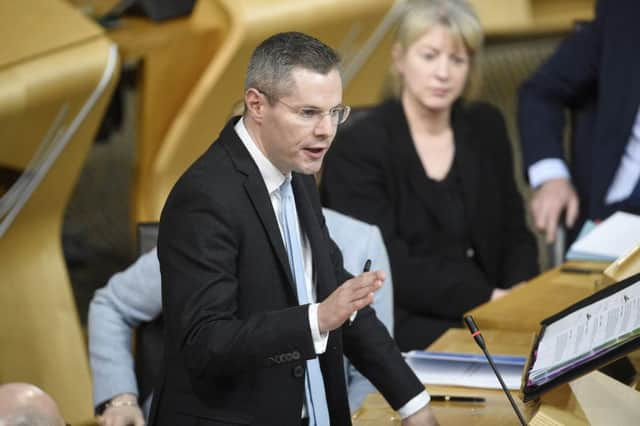Is indyref2 really to blame for potential Scottish recession?


The SNP was accused of neglecting the economy by focussing too much of the apparatus of the Scottish Government on their demands for another referendum on independence.
For their part, Nicola Sturgeon’s party have, through Finance Secretary Derek MacKay, blamed the economy’s contraction by 0.1% on the decision of the vote to leave the European Union.
Advertisement
Hide AdAdvertisement
Hide AdOne thing is for sure: whatever the reason, the broader outlook in 2016 for Scotland was markedly poorer than that of the rest of the UK.
As with much of the political debate in Scotland, the argument over that fact has boiled down to constitutional matters.
Those of a unionist persuasion will argue that the relatively poor economic performance shows why we need the protections of the UK’s broader financial clout or risk recession.
Pro-independence supporters, for their part, are more likely to claim that a contracting economy is a sign that Scots can no longer afford to have their money mismanaged in a broken union.
But is Scotland really at risk of a recession? And just what impact is the SNP plans on another independence referendum having on the economy, if any?
Recession proof?
Most economists define a recession as two consecutive quarters of negative growth (shrinking) in a nation’s economy.
Yesterday’s announcement by the country’s chief statistician means that Scotland is unfortunately halfway there.
The contraction in the final three months of the year mean that Scotland’s economy didn’t grow at all during the whole of 2016.
Advertisement
Hide AdAdvertisement
Hide AdBy contrast, and despite many of the warnings about how Brexit would negatively affect the economy, the UK economy as a whole grew by just under two per cent.
Observers reckon that this shows just how much the Scottish economy was reliant on oil, and how the plummeting price has harmed our overall outlook.
One expert told a trade paper that this is also down to Scotland not having the central economic driver that London provides to England.
The Independence Effect?
As the political blame game intensifies, many political opponents of Nicola Sturgeon are keen to point the finger at her neglecting ‘the day job’ to focus on independence.
Our own leader notes the ‘brinkmanship’ that underpins the First Minister’s independence demands as the Scottish economy appears to stand on a precipice.
Some, such as the Conservative party and certain business leaders, point to the budgetary policy of the SNP, which they claim makes Scotland ‘the highest taxed part of the UK’.
Finance Secretary Derek MacKay is slightly undermined by claiming that the constitutional battle over independence can’t be a factor in this slowdown while still insisting that Brexit, which hasn’t taken place, is the clear reason for this economic contraction.
With new powers that came to Holyrood at the tail end of last year, there are already calls for Ms Sturgeon’s Government to use them to try and stimulating an economy which is sluggish by any measure.
Advertisement
Hide AdAdvertisement
Hide AdIt is, however, simplistic to claim that the indyref2 ‘obsession’ of the SNP is what is behind the growth figures announced yesterday.
Opponents of independence have called on the First Minister to abandon the referendum idea due to the economic outlook, but they are likely to call on her to abandon that idea when confronted with any urgent domestic policy issue.
What business leaders say
Reaction to yesterday’s news was swift - with Liz Cameron, chief executive of the Scottish Chambers of Commerce, the strongest critic as she called on the SNP to alleviate the tax burden on Scottish businesses.
“It is time for the Scottish Government to abandon this high tax agenda before it is too late as these policies risk driving investment out of Scotland,” she said.
While they haven’t intrinsically linked the two issues, the Camber was similarly critical of the First Minister’s indyref2 plans, with the Glasgow Chief Executive noting at the time: “I think they enthusiasm for any second referendum will be severely limited until we have some idea of what the position is that we are faced with.”
And CBI Scotland told the First Minister when she announced her desire to pursue another referendum: “The Scottish and UK governments must continue to work together, with business, to ensure the best deal from the negotiations for Scottish firms, and this work should continue as a matter of priority.,” Hugh Aitken of that organisation said.
Andy Wilcox of the Federation of Small Businesses said yesterday “If Scotland is to avoid recession, we need to see action from governments in Edinburgh and London to boost local firms. Scottish Government and UK Government Ministers need to avoid fixating on inward investment – and put real effort into developing genuinely resilient local economies.”
Those echo his concerns at the time that the referendum was announced, when he said that there was little appetite among his membership for another vote.
As the blame game goes on, and is the threat of recession looms, it is clear that the referendum will continue to turbo charge battles on Scotland’s political, and economic landscape.